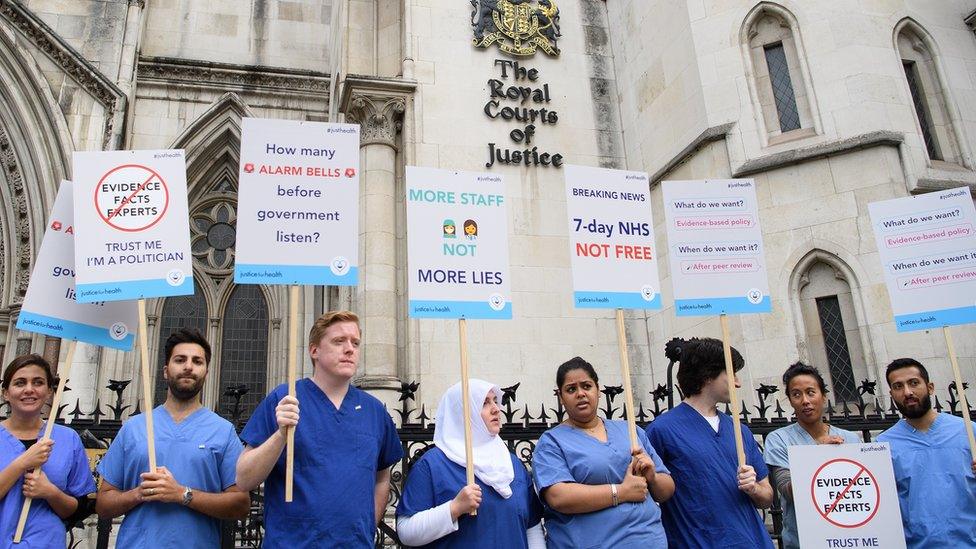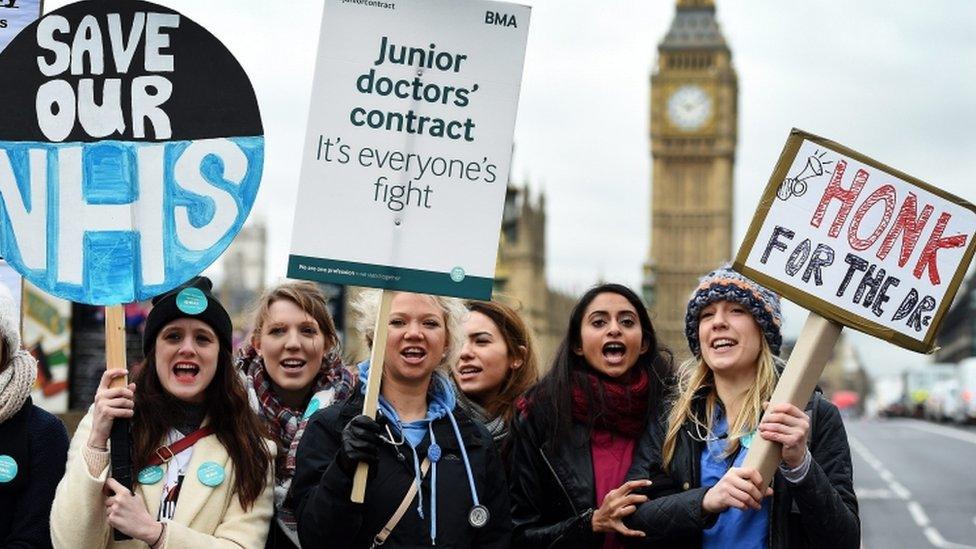Doctors, the BMA and ministers - the state of play
- Published

Junior doctors mounted a legal bid against a new contract at the High Court
All has been quiet on the junior doctor front in recent weeks.
The strikes have been called off and some new medical postgraduates have begun their training under the new contract in England.
So where now for the profession?
Weekend care
A report from NHS Digital, the service's data provider, on the so-called weekend effect in England has reawakened memories of the junior doctor dispute.
It became one of the most contentious issues in the long-running row.
Ministers used evidence that patient care was less effective on Saturdays and Sundays than during the week to justify their seven-day NHS policy in England.
They claimed that lower staffing levels were partly to blame and that a new contract for junior doctors was required to increase weekend cover.
The British Medical Association union strongly disagreed, arguing there was no evidence that staffing levels had anything to do with the quality of care at weekends and that junior doctors already worked across weekends.
The latest study by NHS Digital, the service's data provider, covering the year to March 2016, found that the odds of mortality within 30 days of admission for patients admitted at the weekend were 15% higher than those for midweek admissions.
That's a similar conclusion to a study by Professor Nicholas Freemantle, of University College London, and others published last year.
Recent research from the University of Manchester, however, said that such studies failed to take account of the more severe conditions typically displayed by patients arriving at weekends.
'State of unease'
The latest report on the state of the medical profession in the UK by the medical regulator has touched on another issue at the heart of the junior doctors' dispute - morale.
The General Medical Council says there is now "a state of unease within the medical profession across the UK that risks affecting patients as well as doctors".
The regulator says that while in 2012 nearly 78% of doctors who completed foundation training opted to go straight into specialty training rather than taking a break, this had fallen to just under 66% by 2015.
The Department of Health said it was funding the NHS's own plan to transform services and central to that was listening to concerns of staff.

Talks between consultants and the government about a new contract have dragged on for more than a year
The British Medical Association called off a planned series of five-day strikes by junior doctors in England after signs that there was far from unanimous support.
Officially the BMA remains in dispute with the government but it has not said how it intends to continue its campaign of opposition.
The legal action against the introduction of the contract by a group of doctors called Justice for Health was rejected by the High Court.
The chance to appeal has come and gone, though lawyers for the campaign say the ruling did establish that Health Secretary Jeremy Hunt had no power to impose the contract and it was up to individual health trusts what they chose to do.
Immediate pressures
Talks between the consultants and the Department of Health, meanwhile, have dragged on for more than a year.
These senior doctors have not been in dispute with the government and, through the BMA, have indicated a willingness to discuss a new contract which ministers say will make it easier to increase staffing at weekends.
Back at Easter there were optimistic noises about the consultants reaching agreement with employers.
But since then there has been silence.
There is a cynical view that it is not in anyone's interest for a new contract deal to be reached.
The senior doctors won't want to be seen to be rubbing their junior colleagues' noses in it by reaching an agreement with the government.
Ministers might feel they don't want to stir up more trouble and then risk the membership voting down a deal agreed by the BMA.
Looming over all this is the government's seven-day NHS policy.
Theresa May is understood to believe that, as it was in the Conservative manifesto, it's a commitment that should be delivered.
But it is talked about less than in the David Cameron regime.
There are immediate pressures to deal with, including the ability of the NHS to cope this winter.
Downing Street may feel doctors' employment issues are best left on the backburner.
- Published11 September 2016

- Published28 September 2016

- Published27 July 2016

- Published11 January 2016

- Published6 September 2015

- Published6 September 2015
- Published13 August 2015